Conflict photographer Maximilian Clarke recounts encounters with doctors and drunks in Donetsk and finds that all the people there want is for the world to know what is happening to them
“The tunnel is a passageway to another world; because on the other side is only death”: This, I’m told, is how locals now refer to the underpass beneath Donetsk’s central station that leads to Oktobersky; a district that has been subjected to a protracted bombardment, likely from Ukrainian batteries targeting separatist positions scattered throughout the area.
The station is just a short trolley-bus journey from my hostel, but on that morning the bus stopped short of its destination as two cars had collided violently on the icy road ahead, debris had scattered across both lanes and the road was blocked.
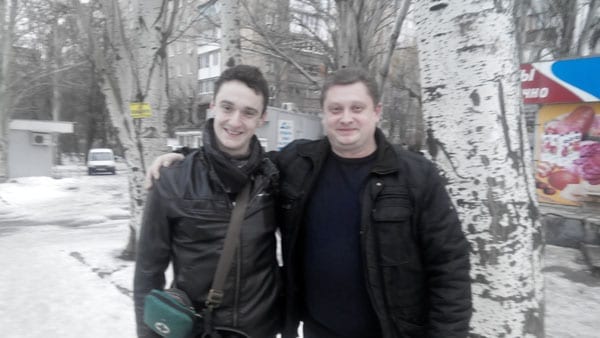
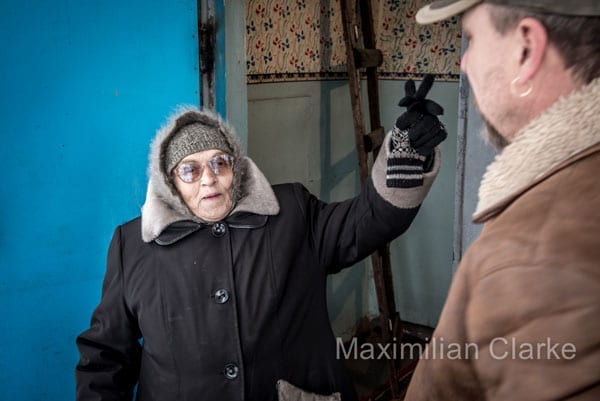
Approaching the station on foot, the sounds of battle grew louder and periodically, sharp blasts would ripple off the buildings around the station’s entrance. Passing through the tunnel, the crash of artillery on the other side was louder still. Alone and unsure of my surroundings, I was preparing to turn back when a man spotted my camera and helmet and beckoned me to follow him. Together we began walking towards the blasts, heading and deeper into the unknown.
We walked along a cratered road for several minutes; passing bombed out houses, shattered windows and splintered trees. Despite the language barrier, I learned his name was Dmitry and that he lived nearby with his young daughter.
The road ahead of us was empty save for a lone woman. She stopped when she too noticed my camera and began speaking. She appeared desperate that I share her message about the destruction in her neighbourhood to people back home: the world must know what is happening to the people of the Donbass. Meanwhile, less than a kilometre away, Ukraine government forces and pro-Russian separatists remained locked in a fierce struggle for control of Donetsk’s symbolic airport.
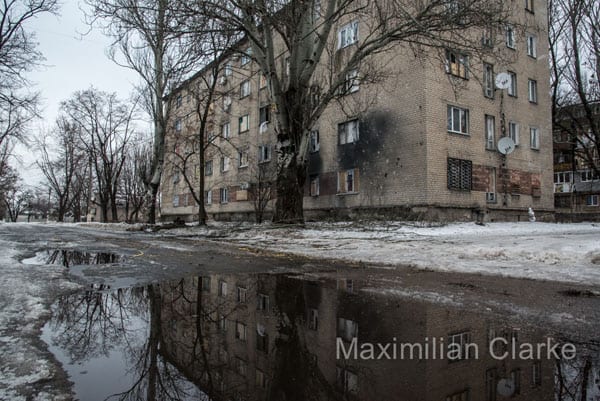
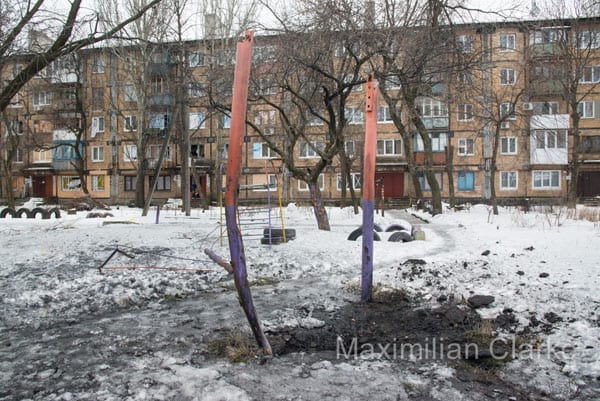
Soon we arrived at a typical Soviet-era apartment complex. Crumbling blocks towered over snow covered, concrete expanses; with dilapidated playgrounds and small convenience stores dotted about. Such environments are depressing enough at the best of times, but the complex had been struck earlier that morning by a full salvo of BM-21 Grad rocket artillery.
“DNR or Ukraine?” I asked. “Ukraine”, came the reply. Incoming artillery continued to land nearby as Dmitry led me from site to site. Apartments, playgrounds, bars and shops had all been hit and I proceeded to photograph the damage with a familiar emotional distance. I had spent the summer in Donetsk and already the process of cataloguing destruction had ceased to shock: another home, ‘click’; another bloodstained road, ‘click’; a fucked up car, ‘click’.
Dmitry then asked me if I had any money so I pulled out 200 hryvnya note (£8.40) and handed it to him – a meagre sum for a fixer in an environment as high risk as the one he had led me through. But he declined to accept it, and instead led us to a bar where he ordered a bottle of vodka before pouring out two large tumblers filled to the brim. We raised our glasses and choked back the acerbic fluid before lighting a cigarette.
The bar, a single storey box with walls, ceiling, floor and furniture of a near uniform brown, was in half darkness as the morning’s rocket strike had downed nearby power lines. Most of the windows had been blown-in and patched with cardboard, blocking out the daylight and compounding the overwhelming beigeness of the place.
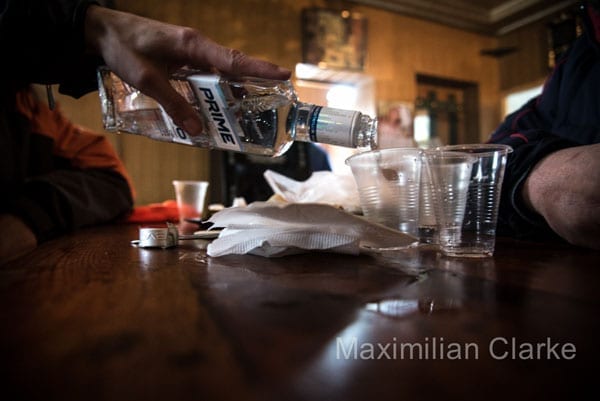
Before long, Dmitry poured us another vast tumbler of cheap vodka. And then another. As we attempted to talk, the walls of the building reverberated with the shuddering crash of artillery falling nearby so I suggested we complete our tour as I needed to be heading home. He agreed, but insisted on pouring out the rest of the bottle. I declined to drink any more so he polished it all off himself.
We were barely 15 metres outside of the bar when Dmitry lost his footing and skidded about on the ice for a few seconds before faceplanting into a pile of ice and snow. I helped him to his feet and, with his arm around my shoulders, attempted to walk him in the direction he said was home.
The ice had opened up a small but clean cut on his forehead that begun to bleed freely down his face and he was leaning heavily on me. Seeing the two of us, swaying along the desolate road, the driver of a passing car stopped sharply beside us began to shout. Though my Russian is limited, I gathered the man was threatening to report us to a DNR block post. In the economically deprived wartorn Donetsk, alcoholism is a serious problem and can be dealt with severely. I did not want to be dumped with a bunch of soldiers and labelled a drunk, so I disentangled myself from Dmitry, who then plopped into a pile of snow where he remained.
I explained to the driver that I was not drunk; that I was a foreign journalist and that I was keen to be heading home. After checking my credentials and realising that I was largely sober and clearly distressed by the sudden deterioration of my new acquaintance, as well as by the proximity of the relentless shelling, offered me a lift back to the station from where I could catch the trolleybus home.
He spoke a little English and I learned he was the doctor in a local hospital – gruelling work when daily more and more casualties are brought in bearing the horrific wounds of war. In the end he drove me all the way to my hostel but before we goodbye, he stopped to take a picture of us. He had taken an interest in my work so I handed him my card.
The next morning I received the following email:
“Hello, Max! My name is *****. I brought you out of Oktobersky, when you stuck with a local drunkard. Glad to meet you. In our hospital, and the hospital yard several times fell shells. If you want to take a photo with us in the hospital or in the neighborhood – I will always help”.
“Please tell [those] in your own country the truth about what’s going on. At least your family and friends”.
“We are not terrorists”.
Maximilian Clarke first worked as a teacher in Afghanistan and then moved on to a local human rights organisation. He more recently been documenting the escalating crisis in Ukraine as a freelance photographer and has experienced everything from the riots in Kiev to the war in Donbass. Follow him on Twitter at @MTIClarke.
Subscribe to our free once daily email newsletter here:

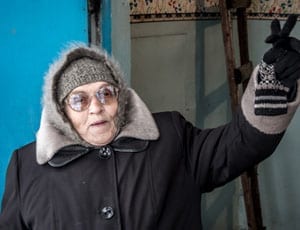







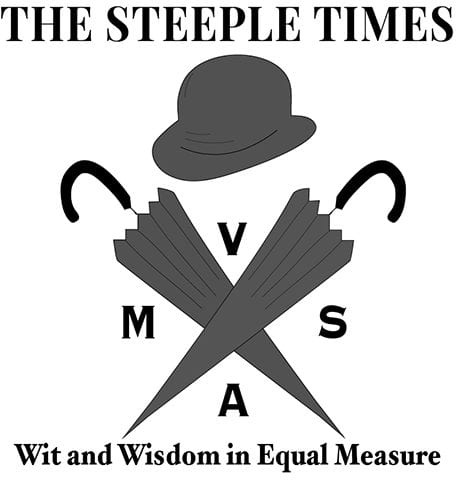
It sounds as bad as India under the rule of Queen the Victoria and the brutal 3rd Foot and mouth regiment.